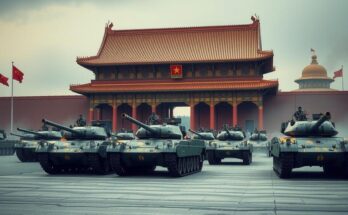Sudan has accused the UAE of breaching the Genocide Convention by funding rebels and has sought interim measures from the UN court to protect the Masalit people. The ongoing conflict, which began in April 2023, has resulted in over 24,000 deaths and mass displacement. The UAE is alleged to have supplied arms to the RSF, despite its denials. Historical context highlights a repeated pattern of violence in Sudan, particularly in Darfur, which necessitates urgent international focus.
Sudan has filed a case with the United Nations court, alleging that the United Arab Emirates (UAE) is violating the Genocide Convention by financially supporting rebel groups. Sudan has requested immediate interim orders from the court, urging the UAE to take measures to prevent ongoing violence against the Masalit population.
Since mid-April 2023, Sudan has faced a brutal conflict arising from escalating tensions between its military and paramilitary groups, particularly in Khartoum. The United Nations reports that the war has caused over 24,000 fatalities and displaced more than 14 million people, roughly 30% of the Sudanese population, with about 3.2 million fleeing to neighboring countries.
The announcement of the case came shortly after the Rapid Support Forces (RSF) and allied factions signed an agreement to establish a competing government. This occurred amidst military advances by Sudanese armed forces against these rival factions. A U.S. State Department-funded group, Conflict Observatory, claims to have identified flights transporting UAE arms to the RSF, which the UAE insists were intended for local hospital support.
In January, the U.S. Treasury sanctioned RSF leader Mohammad Hamdan Daglo Mousa, known as Hemedti, along with several RSF-affiliated companies based in the UAE. This action coincided with the U.S. labeling the RSF’s actions as genocide. The UAE, which is a U.S. ally, has consistently denied allegations of arming the RSF, despite mounting evidence.
The historical context is grim; two decades ago, the Darfur region in Sudan became emblematic of genocide and war crimes, primarily due to acts committed by the Janjaweed militias. It is estimated that up to 300,000 individuals lost their lives, and 2.7 million were forced to flee their homes.
Decisions made by the International Court of Justice, often referred to as the world court, are binding but often take several years to reach a conclusion.
This article could benefit from additional insights from the Associated Press, specifically contributions from Jon Gambrell in Dubai and Mike Corder.
In conclusion, the ongoing conflict in Sudan has prompted serious allegations against the UAE regarding its support for rebels, which Sudan believes breaches international genocide protocols. The resultant humanitarian crisis is dire, with countless lives lost and millions displaced. The forthcoming legal proceedings at the International Court of Justice may serve to address these transgressions, albeit after considerable time. The international community’s attention remains pivotal in addressing these grave human rights concerns.
Original Source: battlefordsnow.com




